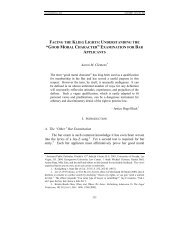The Science and Statistics Behind Spanking Suggests that
The Science and Statistics Behind Spanking Suggests that
The Science and Statistics Behind Spanking Suggests that
You also want an ePaper? Increase the reach of your titles
YUMPU automatically turns print PDFs into web optimized ePapers that Google loves.
11-FULLER_FINAL_AFTERPROOF.DOC 2/17/2009 8:50 AM<br />
2009] THE SCIENCE AND STATISTICS BEHIND SPANKING 249<br />
Nevertheless, spanking’s successes are largely ignored. Many<br />
philosophically oppose corporal punishment <strong>and</strong> praise spanking bans,<br />
but few honestly consider the entire body of child discipline statistics. 19<br />
<strong>The</strong>refore, in this rapidly changing area of the law <strong>that</strong> lies at the heart of<br />
our children’s education <strong>and</strong> future, only one side of the story is being<br />
told. 20 This paper helps expose <strong>that</strong> other side. And if we continue to<br />
ignore <strong>that</strong> side, our children may be the ones <strong>that</strong> suffer.<br />
II. BACKGROUND: THE MOVEMENT TO GRADUALLY ELIMINATE<br />
SPANKING IN THE HOME<br />
<strong>Spanking</strong> is a discipline method defined as striking a child on the<br />
buttocks or extremities “without inflicting physical injury” <strong>and</strong> with the<br />
intent to modify behavior. 21<br />
A. <strong>The</strong> Movement to Change Public Opinion<br />
Many people think Dr. Benjamin Spock started the anti-spanking<br />
movement in the 1940s. 22 This is not really true. Dr. Spock did not<br />
discipline responses other than punishment or reasoning, ignoring, <strong>and</strong> love withdrawal. For older<br />
children, grounding was the only alternative discipline response <strong>that</strong> had more beneficial outcomes<br />
than did physical punishment. But even for older children, spanking had more beneficial effects<br />
than nonphysical punishment <strong>and</strong> verbal put-downs.)<br />
19. See, e.g., Susan H. Bitensky, Spare the Rod, Embrace Our Humanity, 31 U. MICH. J.L.<br />
REFORM 353, 361 (1998) (discussing various European spanking bans before 1998) (“Of the six<br />
countries <strong>that</strong> have enacted statues prohibiting all corporal punishment of children, four countries<br />
have lived with these laws for ten years or more.”). Ms. Bitensky then suggested, without<br />
discussing any criminal statistics, <strong>that</strong> such longevity was a positive sign. Id.<br />
20. See, e.g., Murray A. Straus, Corporal Punishment by Parents, 8 VA. J. SOC. POL’Y & L.<br />
7, 60 (2000) [hereinafter Straus, Corporal Punishment] (saying “[a] society <strong>that</strong> brings up children<br />
by nonviolent methods is likely to be less violent, healthier, <strong>and</strong> wealthier.” Although he mentioned<br />
Sweden as an example, he never mentioned the rise in crime.); Judge Leonard P. Edwards, Corporal<br />
Punishment <strong>and</strong> the Legal System, 36 SANTA CLARA L. REV. 983, 1021 (a U.S. judge relying only<br />
on anti-spanking research to propose <strong>that</strong> it “should be illegal to use corporal punishment on all<br />
children under five years of age.”).<br />
21. E.g., Diana Baumrind, Ph.D., Inst. of Human Dev., Univ. of Cal., Berkeley, Does<br />
Causally Relevant Research Support a Blanket Injunction Against Disciplinary <strong>Spanking</strong> by<br />
Parents?, Invited Address at the 109th Annual Convention of the American Psychological<br />
Association 1 (Aug. 24, 2001) [hereinafter Baumrind, Causally Relevant Research] (“[T]he term<br />
‘spanking’ [refers] to striking the child on the buttocks or extremities with an open h<strong>and</strong> without<br />
inflicting physical injury with the intention to modify behavior.”) (citing S. Friedman & S.K.<br />
Schonberg, Consensus Statements, 98 PEDIATRICS 853 (1996)) (emphasis in original).<br />
22. See, e.g., Daniel Costello, <strong>Spanking</strong> Makes a Comeback: Tired of Spoiling the Child,<br />
Parents Stop Sparing the Rod; Dr. Dobson vs. Dr. Spock, WALL ST. J., June 9, 2000, at W1 (saying<br />
the notion <strong>that</strong> children are too fragile to spank “took hold after World War[ ] II as Benjamin Spock,

















